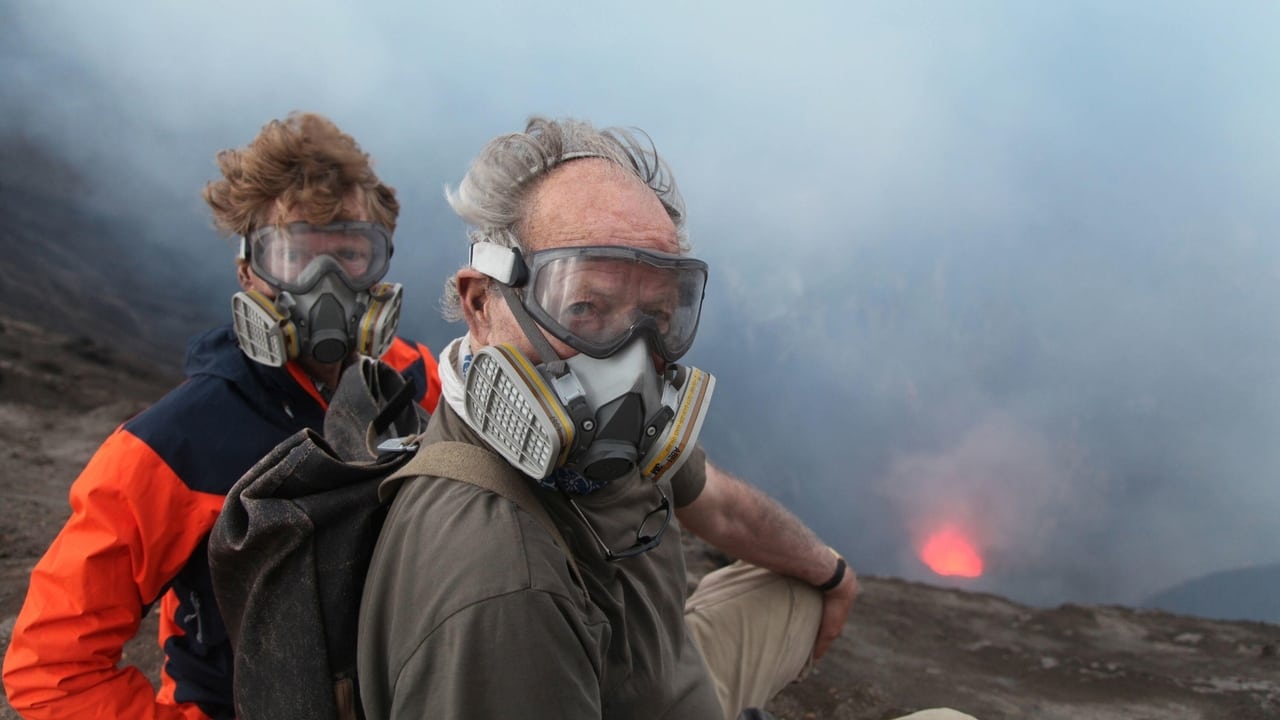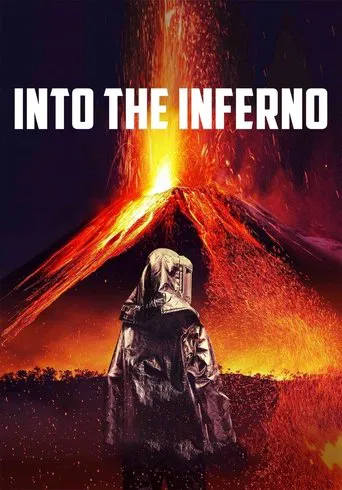

It's just really damn good. Lava is like water but red and hot, really hot, like really really hot
... View MoreBe under no illusion, this is not a volcano documentary. Whatever it is, is not even very good. You will learn almost nothing about volcanoes. There's some 'volcano porn' cinematography but it is dwarfed by a meandering, aimless succession of locations and people without any regard for any kind of unity of time and place, topped by Herzog's monotone narration and grating German accent throughout. It's possibly the worst voice over I've ever heard, and exists only because the director has cast himself in his own film.Confusingly, an eminent British volcanologist takes on the role of both interviewee and interviewer at times, and combined with Herzog's over-bearing vocal presence, you are never quite sure who's in charge of this enterprise. It may be that was an artistic/directorial decision, but it sure when right over my head in that case, and felt to me more like it came out of a lack of planning and focus on part of the director.There is an anthropological dimension to the documentary, looking at the people who live with the volcanoes, but it is conducted in a deeply unsatisfying way. We're treated to long, interminable minutes of a village chief's ridiculous and childish superstitions ("The volcano talks to me.. but I cannot say, it's a secret....the volcano is annoyed because foreigners come here...").This dull and prolonged pseudo-anthropological exercise in filming village people do their incomprehensible volcano-related rituals is followed by various other uninteresting bits until the documentary takes us to North Korea, where Herzog insults your intelligence with fury by suggesting - shock horror - that North Koreans are brainwashed into blind patriotism and admiration for their leader, and - wait for it - that they engage in propaganda! His apparent surprise is such that the film turns into a tired repetition of the same old news about North Korea, and the volcano that brought him there is pretty much ignored.In summary, it's not a good volcano film - you don't see that much, and learn next to nothing. It's not a good documentary about people either. Herzog and his British buddy are rather inept at talking to people and drawing out their interesting side in a way that documentaries demand. What's left is Herzog's ego and unpleasant voice.
... View MoreWerner Herzog is a captivating man who has grand pursuits and a varied set of interests. He has made many films since his breakout hit, "Aguirre, the Wrath of God," in 1972, and all of them have either been exceptionally interesting, complex, fantastical, or illuminating in nature. Herzog makes both fiction and non-fiction films that deal with issues as diverse as colonialism, the savageness of the wilderness, ecological disasters, opera, and ski flying. With his newest film for Netflix, Herzog once again shows us that fascination is an oft neglected but empowering feeling that can be applied to numerous aspects of life. He starts us off with the topic of volcanoes, but he becomes much more fascinated with humankind at large, evidenced by his own reticence to even get close to a volcano.Herzog reels us in with the help of Clive Oppenheimer, a Cambridge University volcanologist that he had previously worked with in the documentary, "Encounters at the End of the World," which was a film about Antarctica. Oppenheimer is a playfully compelling, if timid, guide into the world of volcanoes. He and Herzog travel the world and study volcanoes in Indonesia, Iceland, North Korea, and Ethiopia. At each of these junctures, the cultural importance of the volcano is made the fixture of the film, rather than focusing on hard science. The peoples of these regions all seem to be in awe of volcanoes, and either have a deep fear or respect for what it's capable of. In Ethiopia, a nearby volcano is the key to finding fossils of Paleolithic hominids, the rarest of human fossils. In North Korea the region's fierce patriotism is linked with its local volcano where the leaders Kim Il-sung and Kim Jong-Il once stood, proudly displaying to their nation that they were strong and resilient in the face of outside vitriol.Though some of these excursions seem to undercut the fact that this is a film about volcanoes, this film never bores its audience. Between the panoramic shots of tropical foliage and the drone sequences that pan across villages and volcanoes alike, this is a feast for the eyes. There's a great contrast between the beauty of these regions and the oft-confusing shots of the magma that these ruptures expound with horrifying regularity. The inner regions of volcanoes look both like fire and water, and the magma often looks pitifully tame when it moves slowly down a mountainside, though it is actually a most dangerous force that will destroy all in its path. Herzog talks a bit about a couple who were volcanic photographers and were eventually killed by a fast moving cloud of volcanic ash (at 100 mph). While this tidbit is unprompted, it proves to be yet another interesting facet of these quaking mountaintops. Herzog finds many ways to look at these geographic forces, which can be seen as either benevolent or destructive in power.
... View MoreYou might think that this is a documentary about volcanoes in which case you wouldn't be wrong. However you have to keep in mind that this is a Werner Herzog documentary about volcanoes. Herzog is not so much interested in the facts about volcanoes (I'm sure he'd tell you to read a book if you want facts) but what volcanoes can tell us about ourselves and about us as a species. So how does he do it, you might ask. Herzog reaches very far back, very far, in fact right back to the dawn of man – through an archaeological expedition in Ethiopia that aims to uncover a complete skeleton of such an ancient human beneath the blazing sand. And indeed Herzog captures something prehistoric with this documentary; amidst our digital age which often tricks us to believe we've conquered nature, he renders man once again so incredibly small and fragile against the (in contrast) everlasting thermal forces of the earth. Herzog explores this feeling of impuissance by traveling to tribal communities in the Pacific and by exploring the state of North Korea and the oppressive, propagandistic cult around their leaders (with some at times truly fantastic footage, you have to keep in mind that it's almost impossible to get a permit to film there). In both communities a volcano plays an important role and Herzog expresses multiple times his interest in how volcanoes "create new gods", once again questioning the permanence of our culture which we so often take for granted. In the end what makes this movie so special is that it's surprisingly contemporary despite being about a phenomenon (volcanos) that is almost as old as the earth itself and that Herzog found new ways to once again render the Vanitas motif from medieval times vividly alive. Herzog reminds us that even today with all out technological progress, we are still small, fragile animals against the mighty forces of nature. Memento Mori, they said in the Middle Ages, remember that you have to die. Some have commented that the film is really shattered; however I'd argue that it's actually really focused on its theme. Don't expect my review to follow the film chronologically though, it takes it's very own spins and turns. And don't expect the film to be sad, it's actually quite witty and filled with funny ironies. Likewise it assembles a large array of different great and fascinating footage from all around the world. However I'd still like to leave you with a famous old poem from one of Herzog's fellow countrymen (which I'm convinced he knows as well), here's Friedrich Hölderlin's "Hyperion's Song of Fate" (be sure to read it in its original German form if you speak the language):Up there you walk through the light on delicate grounds, Elysian Spirits! Shimmering breezes of Gods touch you as softly as the hand of the harpist touches her sacrosanct strings.Unencumbered by fate, like a slumbering newborn, are breathing the heavenly dwellers; chastely protected by a bud unassuming flowers for them eternal the spirit and their hallow'd eyes shine in serene clearness forever.But to us it was given never and nowhere to rest: we suffering humans vanishing, falling blindly from one hour to the next are thrown like the water cliff down to cliff, yearlong into the unknown abyss.
... View More